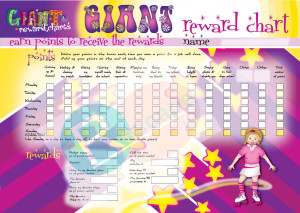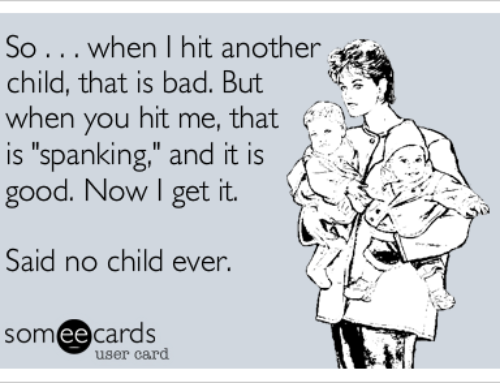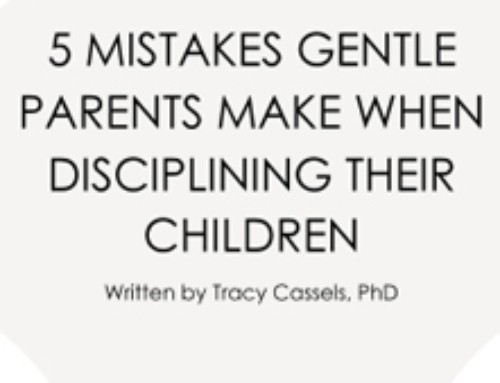Often in today’s society when a parent is faced with a child who is disobedient, not using the toilet as the parent would like, not doing homework, not cleaning up, or any number of things that parents want their children to do, they are told to start up a reward chart. You know, the kind where kids earn stickers or stars or even a checkmark for every time they do something “good” and after a certain number, they get a tangible reward. It could be a trip to the park, a dessert, a new toy, whatever. You get the picture.
The basis of reward charts stems from early behaviourist theory (yes, the same theory that told us holding children too much will spoil them or that you need to ‘condition’ your child to not cry at night by not responding). The idea is that children will receive a reward which will reinforce the behaviour you desire. And not surprisingly it works. When there is a reward, children will work towards that goal, sometimes even harder than they might if there were no reward.
So what’s the problem? Isn’t this great?
Well, I suppose it is if you always have a reward and you can guarantee that your children will always be rewarded for what they do. And not just feel-good rewards, but extrinsic, tangible rewards of things they want.
But what if there isn’t this reward? Most parents don’t want to have to keep giving rewards for cleaning up or doing homework. They want their child to internalize the acts so they do it on their own and you can eventually get rid of that nasty chart and the rewards that go with it. This is where the concept of intrinsic motivation comes into play.
For those unaware, the term “intrinsic motivation” refers to the idea that some activities provide their own inherent reward or enjoyment, and thus motivation to do these activities is not based on external rewards or control[1][2]. If I take EP, as an example, when I started writing, I had no external rewards. No one was really coming to the site and it certainly didn’t make money (though that hasn’t changed too much). But I loved writing the articles and doing the research and just expanding my own mind in the process – I was intrinsically motivated. As a child I was the same with puzzles or logic problems or math problems. I could sit and spend hours doing them simply because I enjoyed them. Didn’t need any type of external reward for them. Generally people have at least a few things that they feel this way about and many other things they don’t feel this way about (and probably many of them are things we were rewarded for as children). This is what most of us report wanting for our kids. We want them to find some level of internal satisfaction in what they do, whether it’s homework, cleaning, playing, etc. When they learn new skills, we want them to learn to enjoy them for what they are so they’ll continue to try and learn and master new things as they get older.
Now imagine if you were working on something new or learning a new skill and every time you engaged in it, you were really working towards a external reward. Then the reward was taken away. Would you continue to do that work? Well, what research has shown us is that you might not, at least not to the same degree as if you had never been given that reward in the first place (e.g., [1]). The intrinsic motivation is reduced, even if the level of enjoyment reported for the task remains the same.
This is not just something parents have noticed (though yes they have noticed it over the years), it has been tested experimentally in many, many studies. One of the more recent meta-analyses includes 128 studies on the topic[3] with results I’ll cover in a moment. But first I want to mention that there are different types of rewards that can be given and may not be equal. In one of the first studies on the topic (i.e., [1]), an external reward of money decreased intrinsic motivation in college students, however, verbal rewards in the form of praise for the work done seemed to increase intrinsic motivation so if you use a tracking chart (as mentioned above) and do a verbal celebration or encouragement, that’s awesome. One of the important areas, then, to consider is the type of reward given, something addressed in this meta-analysis.
So… what does the research find?
|
Type of Reward |
Effect on Intrinsic Motivation (IM) |
|
All rewards together |
Free Choice Behaviour (as measure of IM): Small but significant effect lowering IM. |
|
Tangible Rewards |
Free Choice Behaviour: Small-moderate effect decreasing IM, but this was tempered by differences in unexpected and expected tangible rewards (see below). |
|
Unexpected Tangible Rewards |
Free Choice Behaviour: No effect on IM. |
|
Expected Tangible Rewards |
Free Choice Behaviour: Moderate-small effect decreasing IM. |
|
Verbal Rewards |
Free Choice Behaviour: Small-moderate effect increasing IM; however, results differed by age. Children showed no effect while college students showed a moderate effect. |
The authors also compared the type of contingency with rewards, but the results are quite similar to what you see here so I’ll leave it at that. One thing I would like to point out is that “small” effects are not negligible effects. The authors, and thus I, use effect size terminology which explains effect sizes in practical terms. This means a “small” effect is practical and you will notice a small difference in life (on average, of course, as stats are based on large populations). This is different from statistical significance (although all the effects here are statistically significant as well) which can be influenced greatly by sample size. So what we’re seeing are real effects. Take a group of people and the differences will be noticeable in their behaviour, although it will be small.
What do we take from this?
Well, first, rewarding children’s behaviour with tangible rewards will at best not increase their intrinsic motivation and at worst will decrease it. All this in spite of still verbally maintaining the same level of enjoyment of an activity. This is not too surprising to many developmental psychologists as they know that from birth onward, children are naturally curious and inquisitive and eager to learn; in short, they have an abundance of intrinsic motivation[4]. It’s up to us to maintain that and while there are other factors (such as the tendency for an individual to attribute success to an internal locus of control versus external[5]), reward charts are one way we can interfere with this innate sense of intrinsic motivation. Interestingly, some research shows that individuals with an external locus of control are particularly susceptible to the effects of reward charts (while those with autonomous control may not show any ill-effects)[6]. (This raises another question of for whom reward charts may be particularly negative or have no real effect, a question that deserves further research.)
[Side note: A quick example of external locus of control versus autonomous control would be comparing two children who dislikes homework but do it anyway. The child with an external locus of control would do it because his parents make him/her – s/he is under their control. The child with autonomous control does it because, although s/he dislikes it, s/he sees the value to her/his future plans and thus derives the motivation to do it for this external reason. Neither of these children are showing intrinsic motivation and this is where the locus of control aspect enters the discussion as we all have things we do – or at least start doing – for external reasons. Why we continue them, however, is the question. And clearly the reward chart is a very clear example of not only external reward, but an external locus of control as well as it is set up and rewarded by someone outside of the individual.]As parents or teachers or caregivers, I would hope we are cognizant of the effects we have on our children. Fostering an external locus of control and the use of reward charts are ways in which we inadvertently reduce our children’s drive to be curious, to learn, to explore, and to master the skills they are interested in or just simply need to master. These types of teaching do nothing to help a child grow up to feel responsible for his or her own actions and more importantly to learn to enjoy and find inherent pleasure in many of the more mundane acts.
So ditch the reward. It may take longer to achieve the types of behaviours expected of a child, but in the end it will be completely worth it.
[1] Deci EL. Effects of externally mediated rewards on intrinsic motivation. Journal of Personality and Social Psychology 1971; 18: 105-15.
[2] Ryan RM, Deci EL. Intrinsic and extrinsic motivations: classic definitions and new directions. Contemporary Educational Psychology 2000; 25: 54-67.
[3] Deci EL, Koestner R, Ryan RM. A meta-analytic review of experiments examining the effects of extrinsic rewards on intrinsic motivation. Psychological Bulletin 1999; 125: 627-68.
[4] Harter S. Effectance motivation reconsidered: toward a developmental model. Human Development 1978; 1: 661-9.
[5] deCharms R. Personal Causation. New York: Academic Press (1968).
[6] Hagger MS, Chatzisarantis NLD. Causality orientations moderate the undermining effect of rewards on intrinsic motivation. Journal of Experimental Social Psychology 2011; 47: 485-9.







I’ve never liked reward charts purely because they seem so manipulative to me. I’ve never used them with my daughter and never intend to.
But you’ve made me see them in a new light now. It’s interesting; when I was studying to be a psychiatric nurse we learned about the locus of control and motivators. People with an external locus of control tend to struggle in psychiatric care because they want someone else to make them better. They have little intrinsic motivation. Those with an internal locus of control, and therefore intrinsic motivation, are more likely to take responsibility for their own care, and are in turn more likely to recover. I guess many of these personality types are set in childhood, perhaps through the very means you’ve discussed above.
I clicked on this specific article because I thought I saw something like although reward charts aren’t beneficial, chore charts are???
What’s the consensus on posting weekly responsibilities as a member of the family? As long as we aren’t rewarding each trivial item or cumulative items. My daughter is 18 months so we are ways off on responsibilities, but I was so enthused by your “educating the experts” series. I want to be ready. 🙂
Lots of families do that! I think it can be great to help everyone know what they’re responsible for. Is there a reason you’d think otherwise?
I agree completely with this, i passionately dislike the whole reward chart theory.
However my daughter in her first year of school was experiencing such separation anxiety, I had discussed at length with her what she was feeling, talked with the teacher, tried all sorts of strategies. I did alot of research into separation anxiety and one site suggested a ‘bravery ladder’ earning a sticker each time she went into class without squealing and grabbing me tight.
It seems to have changed her behaviour, as much as i dislike the technique.
Do you have suggestions for dealing with such a situation without this?
Thanks so much!
I think I personally would have asked her what made her feel comfortable and to come up with steps with her that she felt she could achieve one by one. And allow for extra time. Sometimes it just takes that extra bit for her to do it. But involving her in the steps – maybe break it down so the first week she learns not to squeal, but can grab you tight. The next week you hug tight, but no grabbing, etc. But of course, each step has to be something she feels she can accomplish. Then of course she can track them each day (was she able to do it?) and talk about how she felt about doing it or if she didn’t, how she felt that day. No rewards or punishments, and it becomes her own self-directed learning. Do you think that would have worked?
Interesting, I never really thought about this before. My parent’s did it with my siblings and me for about a year. We always did our chores quickly so we could get a sticker on our chart. Our rewards were weekly family based, and each month we would get to pick a $5 toy at the store. Our “family” rewards were playing a game of baseball on Friday night after school with Mom and Dad, renting a movie on Wednesdays, and whoever got the most stickers for the week got to pick the board game we played on Saturday. I am not sure why my mom stopped doing it. I am the type of person who does things for praise. Always been promoted within months of starting a new job, got straight A’s and had 3 college degrees by 21. I am incredibly competitive with these things, and never really knew why. I am not sure if the chart had any effect on that, but I HAVE to have a cleaning chart in order to get anything done in my house.
“children are naturally curious and inquisitive and eager to learn; in short, they have an abundance of intrinsic motivation”
No one can really disagree with that statement, but I am not sure what that has to do with establishing positive/good behaviour.
My wife and I have used and are still using reward charts with our kids and they are not meant to teach them to be interested and learn new things they like, but to help them behave also in a way that will contribute to the family’s harmony.
But they have intrinsic motivation to help family if put that way – start young and let them see the way contributing to family harmony is worth it in an of itself, not because you get something extra for doing that. After all, you don’t get “extra” external benefits, do you?
So how would you suggest that you encourage your children to want to behave? I think my parents did a fantastic job raising 4 kids who were very close in age, with very little money, but my Mum says if she had her time over, the only thing that she would change, is instead of just correcting bad behavior, she would reward good behavior – the mundane stuff like clearing the table when you are asked and not pulling the dogs tail. Which is why I have been looking at reward charts. I have a 3 year old and a 6 month old and am really struggling with my 3 year old, even though I’m putting a lot of effort into ensuring that we get a block of special ‘Mummy / daughter time’ a day doing what she wants.
Why not just say thank you and tell your child how much you appreciate it when they help out? Things like special time should NOT be linked to doing chores or anything like that – imagine how that seems to a child! (Mommy only spends time with me if I do something… not really fair, right?) At 3 though, you should expect it to take time to learn. When you ask for something, have you explained WHY you want it done? Do you listen to your child’s objections? Also, according to research, the best thing you can do is to follow your child’s lead at times too when she asks you to do something. Give and take – model what we want to have happen 🙂
When my twins were 3 they asked me to make a 100s chart for reading stories. We put a sticker in a space after each story we read. I asked what will happen when we get to 100 stories? The answer was “We will celebrate! We will go like this *throws hands up, dances in a circle* and say ‘YAAAYYY’!” And we did, and it was amazing.
I was relieved because just a few months prior to this was our first and only attempt at behaviorism. I made them a reward chart for going poo-poo in the potty. They each picked out a Merida bow and arrow set, we put them on top of the fridge, and they knew that they could have their set after going potty for ten days. One twin got it no problem, the other became a power struggle. It was awful, but thank God we didn’t end up with any lasting toilet issues. Lesson learned.
That’s awesome! That’s exactly the type of chart one should have – track it, celebrate it, but no need to reward it outside of celebration 🙂
So what would you do to encourage a 3yo to at least *try* to use the potty? Every time we suggest it, she screams and refuses. She has literally no desire to try.
I would have her go bottomless around the house. But you can also use a tracking chart without rewards or any punishment 🙂 Perhaps just keeping track of when she tries to sit in it would be good. Also, if you’re using a small toilet try the big one and vice versa.
[…] Reward charts: what are they good for (almost) absolutely nothing […]
[…] https://gku.flm.mybluehost.me/evolutionaryparenting.com/reward-charts/ […]
[…] not getting a lot of love in the parenting world. Experts like Tracy Cassels, Ph.D., assert that sticker charts rarely work and when they do, they can backfire because the child begins to expect a reward. With the biggest […]
[…] not getting a lot of love in the parenting world. Experts like Tracy Cassels, Ph.D., assert that sticker charts rarely work and when they do, they can backfire because the child begins to expect a reward. With the biggest […]
So my kid is in Kindergarden now. They have a clip chart for behavior. Child is well behaved, high IM to be kind, safe, thoughtful & considerate. But massive negative effect of chart on self worth due to not being rewarded daily for being ones self.
To be rewarded for common decency where one specific act is picked out over others as notable, and the next day continuing on as ones self and no individual acts are picked out for reward led on the third day to constructed manipulation of the reward system to gain the elevated status (a forced act of kindness for the sake of reward over a natural act of kindness for the sake of consideration of others).
And on the fourth day the devised plan in a busy classroom led to no reward but feelings of low self worth, dispair and uncertainty of this new environment.
-fortunately such a sensitive child is highly verbal and so we had the good fortune of being able to work through it at home…others I am sure will not have that luxury.
I am not a fan of any of these charts and only wish they were known widely as entirely passe.
[…] to praise them, either. Timeouts are bad for your kids, too. Thinking of trying a reward system? Don’t, because that’s bad, too. Feeling overwhelmed and like there’s no good way to discipline that […]
[…] (e.g a puzzle) or do chores (for a sense of accomplishment, a clean living space). Basically, Evolutionary Parenting states that “rewarding children’s behaviour with tangible rewards will at best not increase […]
My son refused to go to school so I made a reward chart as suggested. This was a very lazy approach as nobody thought to ask my son why he didn’t want to do school. My son also had mysterious headakes and a temper, it turned out my son had ASD, I suspected something was wrong but nobody listened, teachers told me not to get him tested and it was my fault. Reward charts for big things are dangerous,
British schools are telling parents to use them when kids have big problems, these charts are harmful if used in this way.
What a load of drivle
Reward charts is really work. BUT……
I have three kids. The eldest child I raised using rewards and everything was fine, but when he was about 5 years old, he accumulated the amount he needed and refused to do chores. I couldn’t make him do anything else, because his already had a certain attitude to matters. Now he is 7 years old, it is impossible to force him to do household chores. I don’t know what to do. I am not ready to put pressure on him, as it affects the child’s mental health. With the second child, everything was somehow easy, he took the vacuum cleaner himself, helped clean the table and put away the toys. He repeated everything after me and I just praised him. The third child I raised using printable star reward charts. The son liked it, but the stars were constantly lost. Then we switched to the Manini app. Now the youngest child is 3 years old and we already know how to do a lot. I don’t scold him if he misses something or doesn’t want to do it.
Now I think about it and wonder how different all children are)
[…] basic principle behind a reward chart is simple: by providing positive reinforcement for desired behaviors, you can encourage those behaviors to […]